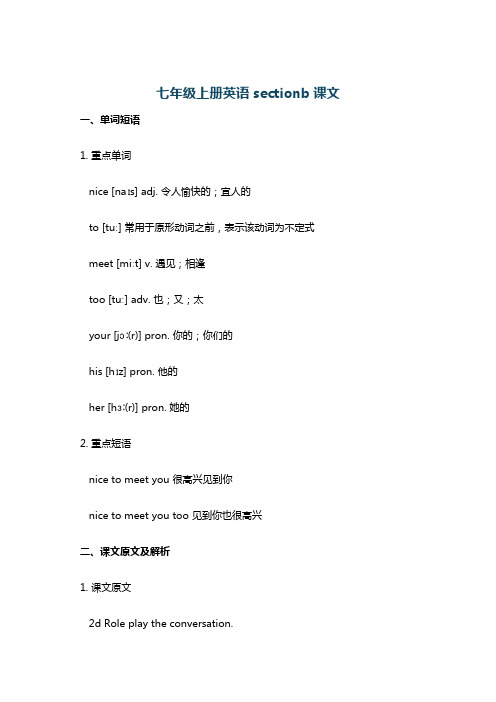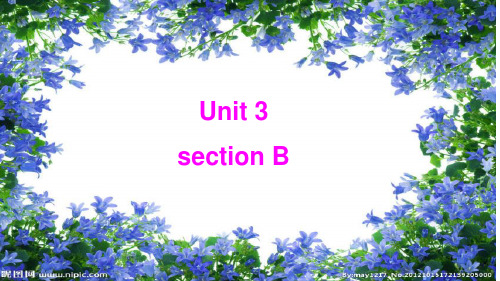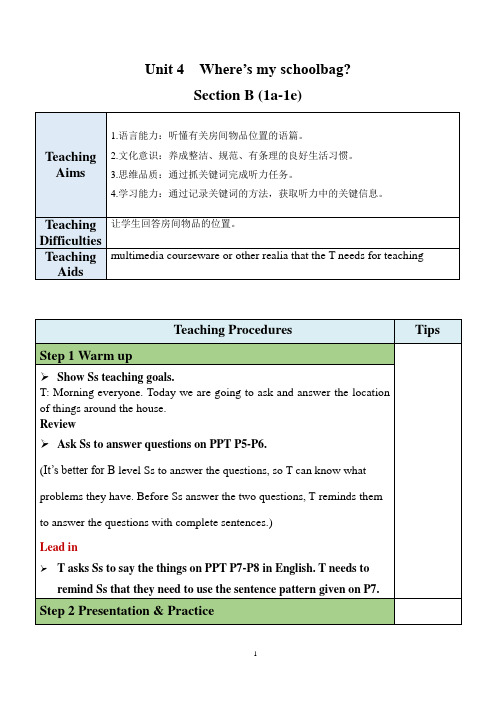Section B
人教版九年级上册英语Unit 2 背记手册 Section B 附答案

Section B (1a-Self Check)重点单词1. treatn. 款待;招待v. 招待;请(客)2. Christmas n. 圣诞节3. liev. 存在;平躺;处于4. noveln. (长篇)小说5. deadadj. 死的;失去生命的6. businessn. 生意;商业7. punishv. 处罚;惩罚8. warnv. 警告;告诫9. presentn. 现在;礼物adj. 现在的 10. warmth n. 温暖;暖和11. spreadv. 传播;展开n. 蔓延;传播词形变换1. lie—lay (过去式)—lain (过去分词)2. dead—die (动词)—died (过去式)—died (过去分词)—dying (现在分词)3. spread—spread(过去式)—spread (过去分词)4. warm—warmth (名词)5. punish—punishment (名词)6. important—importance (名词)重点短语1. make money挣钱2. care about 关心;在乎3. end up最终成为;最后处于4. give out用尽;分发重点句型1. What does Wu Yu think of this festival?吴宇认为这个节日怎么样?2. I think it's fun to dress up as cartoon characters!我认为装扮成卡通人物很有趣!3. He is mean and only thinks about himself. He doesn't treat others nicely.他很小气,只想着自己。
他对待其他人也不友善。
4. Marley used to be just like Scrooge, so he was punished after he died.马利曾经就像斯克鲁奇一样,所以他在死后受到了惩罚。
Section B内容详解

Section B内容详解1aPut these words in the correct columns in the chart.(Some words can go in more than one column.)将下面的单词填入表格中正确的栏目下。
有些单词可能不止填入一个栏目下。
fool(1)傻瓜;愚弄invite(7)邀请costume(2)全套服装embarrassed(8)尴尬的go off 跑掉get up(9)起床get dressed(3)穿衣服empty(10)空的;倒空show up(4)出席realize(11)意识到;想起change(5)变化clock(12)钟表exhausted(6)极度疲惫的stay up(13)不睡觉要点解疑(1)fool作名词时,意为“笨人;傻瓜;蠢材”;作及物动词时,意为“愚弄;欺骗;诈取”;作不及物动词时,意为“成为傻瓜;干蠢事”。
例如:What a fool she is! 她真是个傻瓜!He often fools his friends out of their money.他经常诈骗他朋友们的钱财。
Stop fooling about with that knife or someone will get hurt.不要摆弄那把刀,会伤人的。
(2)costume意为“服装”,用来指某一时期、某一团体或某项活动时,人们穿的样式相同的衣服。
例如:The actor in strange costumes is Jackson.那个穿着奇装异服的演员是杰克逊。
People wore historical costumes for the party.人们穿着古装参加聚会。
(3)get dressed意为“穿着……的衣服;修整;装修”。
dress后面不能直接跟“衣服”类的词做宾语。
dress的常见句型有:dress sb./oneself“给……穿衣;打扮”;“get/be dressed in+衣服或表示颜色的词”意为“穿着……的衣服”;“dress+副词/介词短语”意为“穿着……”。
七年级上册英语sectionb课文

七年级上册英语sectionb课文一、单词短语1. 重点单词nice [naɪs] adj. 令人愉快的;宜人的to [tuː] 常用于原形动词之前,表示该动词为不定式meet [miːt] v. 遇见;相逢too [tuː] adv. 也;又;太your [jɔː(r)] pron. 你的;你们的his [hɪz] pron. 他的her [hɜː(r)] pron. 她的2. 重点短语nice to meet you 很高兴见到你nice to meet you too 见到你也很高兴二、课文原文及解析1. 课文原文2d Role play the conversation.Jenny: Good morning! I'm Jenny.这是一个简单的打招呼并自我介绍的句子。
“Good morning”是常见的早上(上午)的问候语,“I'm...”是用于自我介绍的句型,意思是“我是……”。
Dale: Good morning, Jenny. I'm Dale.回应对方的问候并进行自我介绍。
Jenny: Nice to meet you, Dale.“Nice to meet you”是初次见面时常用的礼貌用语,表示很高兴见到对方。
Dale: Nice to meet you, too.这是对“Nice to meet you”的回应,表示见到对方也很高兴。
3a Look at the name list. Write the first names and the last names.This is a name list exercise. It helps students distinguish between first names (given names) and last names (family names). For example, if the name is “Jenny Green”, “Jenny” is the first name and “Green” is the last name.2. 语法点be动词的用法在这部分课文中,“I'm...”(I am的缩写形式)中的“am”是be动词的一种形式,用于第一人称单数I作主语的情况。
Unit 10 Section B(1a-1d)九年级全册英语教学课件(人教版)

In Japan
You're (not) supposed to...
point at anyone with your chopsticks
start eating first if there are older people at the table
返回
What should we notice in a Western meal?
Chinese Table Manners
It’s rude to stick the chopsticks into the bowl. We’re not supposed to talk aloud at the table.
In China, it’s impolite to
use your chopsticks to hit an empty bow.
• make noise while eating 吃饭时发出声音
• stick the chopsticks into the food 把筷子插在食物里
• point at someone with the chopsticks 用筷子指着某人
• eat while walking down the street 在路上边走边吃
Section B 1a—1d
Let's enjoy a video.
How much do you know about table manners around the world? There are many table manners around the world. But different countries have different customs.
四级听力sectionb做题技巧

四级听力sectionb做题技巧一、题型分析1. 多选题:考查考生对听力材料的整体把握能力,要求考生在短时间内分辨主题、关键词,并进行准确的答题。
答题时要注意每个选项之间的区别,以免选错。
2. 填空题:考查考生对细节的捕捉和归纳能力,要求考生能够对所听材料的内容进行整体理解,并准确地填写答案。
答题过程中要注意听清数字、时间和地点等关键信息。
3. 判断题:考查考生的推导和判断能力,要求考生能够根据所听内容做出准确的判断。
答题时要仔细分析题目和听力材料的关系,避免主观臆断。
4. 表格填写题:考查考生的信息匹配能力,要求考生能够将听到的信息与表格中的要求进行匹配,填写准确的信息。
答题时要注意信息的匹配和对应关系。
二、备考技巧1. 提高听力水平:平时要多听、多练,增加对英语听力的感觉和理解能力,培养辨别、筛选重要信息的能力。
2. 关注关键信息:在考试中要特别注意关键词、数字、时间和地点等重要信息,有的时候考生只要关注这些信息便能辨别选项的优劣。
3. 注意听力材料的逻辑结构:通过对话和短文的逻辑结构的了解和把握,可以更好地理解听力材料,进而准确地回答问题。
4. 注意细节:在填空题和表格填写题中,一些细节信息可能成为填空的关键,因此要特别留意听力材料中的细节。
5. 错误排查:在做题时如果有些选项自己不确定时,可以首先排除自己认为绝对错误的选项,再进行挑选。
6. 谨慎判断:在判断题中,要注意听力材料的真实性和客观性,谨慎进行判断,避免主观臆断。
三、经典范例1. 多选题听到一段对话后,题目让选择最可能是对话的主题。
题目:What is the conversation m本人nly about?A. A plan for a tripB. Apl本人nt about a classC. A discussion of a problemD. A decision about a new meeting time根据听力材料的内容,要对话的主题进行准确的把握,排除选项的干扰,最终选出正确答案。
Unit 1 Section B(1a-1d)课件人教版2024新教材七年级上册英语

play tennis big family
She is 14 years old. She is from Singapore. She has a pet bird. I like to play tennis.
1d Compare yourself with either Pauline or Peter.
1. What can you see in the pictures?
A guitar, the big ben in the UK and Beijing roast duck.
2. Where are pictures?
They are on a board.
3. What are the pictures used for?
each other 彼此
Prediction(预测) Look at the picture and answer these questions.
1. What can you see in the pictures?
A parrot, Merlion in Singpore and a badmiton.
Review
按要求写出正确的单词、词组或句子。
1. 在同一个班级 (短语)in__t_h_e_s_a_me class 2. 班主任 (短语) _c_l_a_ss__te_acher
Section B 内容详解

Section B 内容详解①The UFO is landing.不明飞行物正在降落。
a.land作为动词作“上岸”“着陆”“(落下时)着地”解,可作及物或不及物动词用。
如:The children landed on the island safely.孩子们安全地登上了那座岛。
The ship landed us safely after the storm.暴风雨过后轮船将我们安全送上了岸。
We landed at the airport in Chicago.我们在芝加哥机场着陆。
The pilot landed the plane very carefully.飞行员非常小心地驾驶飞机着陆。
A drop of rain landed on my head.一滴雨落在我的头上。
A bag of rice fell off the truck and landed in the middle of the road.一袋大米从卡车上掉下来,落在道路中间。
b.land作为名词大多用作不可数名词,意思是“陆地”,是river和sea 的相对词。
land也可作“土地”“地产”解。
如:Are you going by land or by sea?你是从陆地上走还是从海上走?Many farmers left the land for jobs in town.许多农民离开庄稼地到城里去找工作。
The farmer has a lot of land.这个农民有许多土地。
【注】land作“陆地”解时,与sea和river相对。
ground指室外的“地面”,与floor室内地面相对。
如:He lies on the ground under the tree.他躺在树下的地上。
(不用floor)In that hospital, the ground is covered with grass and the floor is covered with carpet.这家医院室外绿茵满地,室内铺有地毯。
四级第三部分 sectionb

四级第三部分 sectionb
Section B是CET-4中的第三部分,通常是一篇较长的短文,字数多在800以上。
这部分的重点是考生的阅读理解能力,需要根据短文
内容回答若干道问题。
对于很多考生来说,Section B是最难应对的一部分之一。
那么该如何提高自己的阅读理解能力呢?
首先,要培养良好的阅读习惯。
阅读习惯的养成需要从平时开始,平时多读书、多看报、多看杂志、多看英语网站,增强自己的语感和
阅读速度。
每天坚持阅读英语材料,可以有效提高英语阅读速度、阅
读理解能力、词汇量和语法水平。
其次,要注重阅读技巧的学习。
英语阅读理解考试常常考查考生
的阅读技巧。
例如,如何快速找到答案、如何判断信息的可靠性、如
何分析文章的结构和语气等等。
从这些方面入手,注重阅读技巧的学习,可以帮助考生更加高效地阅读。
还有一点,就是要养成多思考的习惯。
在看完一篇阅读理解后,
考生可以思考一下自己对于这篇文章的感受、文章结构和论点是否有
说服力等等。
同时,也可以总结一下自己的错误和不足之处,加以改进和提升。
以上这些方法,可以帮助考生提高英语阅读理解能力,更好地应对Section B部分的考试。
当然,平时的积累和环境的营造也是非常重要的。
希望所有的考生都能在CET-4中获得好成绩!。
大学英语四级听力section B解题方法

B、数字类:包括直接型和计算型。如
W: Do you live in a college dormitory? M: Yes, I do. It's a six-man suite, but at the moment only four of us live there. Q: How many people share the suite now?
5) 问"对某人或某事有什么看法",如:
What does the man think of Miss Brown? What does the woman think of the plan?
6)主要问"对话可能是在什么场所发生的",即:
Where does this conversation most probably take place? Where does this conversation most likely occur? Where are the man and woman?
9) 问日期,如:
When will the winter vacation begin?
10)用提问的问题可以问原因,也可以问目的, 如:
Why is the man late? Why did the man repair the car by himself?
11)可能问对话者某一方的身份、对话人之间的 关系或对话中涉及到的其他人的情况,如:
这类对话中往往先后出现几种情况,要注意听 问句是什么,然后再作出选择。
5、几种常见的解题方法
1. 重读原则:某单词被反复读到或是在语音上 加以重读,因引起重视如果选项中出现很可能 是正确答案
人教版英语9年级上册第3单元sectionB知识点总结

要求;请求
request sb to do sth 请求某人做某事
request sth. from sb. 向某人请求某物
6. Both are correct, but the first one sounds less polite.
correct adj. 正确的;恰当的,= right correctly adv. correct v. 纠正,改错
lead into 导入;引入 lead to 导致;通向
9. I'm looking forward to your reply.
look forward to 期望;盼望
look forward to doing sth. reply n. 答复 =answer reply ...to... ...的答复
1. 一对,一双,一副 2. 在a和b之间 3. 获取有关…的一些信息 4. 早一点儿 5. 一个吃饭的好地方 6. 在不同情况下 7. 准时 按时 8. .... 的角落/拐角处 9. 停车场 10. 和…交流
1. a pair of 2. between A and B 3. get some information about 4. a little earlier 5. a good place to eat 6. in different situations 7. on time 8. the corner of... 9. parking lot 10. communicate with
direct adj. directly adv. indirect adj.
直接的,直率的 间接的
8. Sometimes we even need to spend time leading into a repuest.
初中英语九年级上册《SectionB》优秀课件

Topic 3 What can we do at home to protect the environment?
Section B
Let’s play a game.
Say a sentence with and, or, but & while like this one by one. A : I like English and I’m good at it. B: I am good at English while my good friend is
毕竟,归根结底
4 Work in groups and survey your group members about what they do to be greener people. Then report it to your class. Pay attention to the stress, liaison, incomplete plosion and intonation. Example:
自学指导4
• 自学内容:课本46页2、3 • 自学方法:合作探究。 • 自学时间:5分钟 • 自学要求:完成p46页2、3。
2 Choose the correct verbs or phrases to complete the
statements. Then match them with the right pictures.
3. _R_e_c_y_c_le__ boxes and plastic bottles. 4. _G_r_o_w____ fruit and vegetables yourself. 5. Try to _r_id_e_____ a bike when you travel. 6. _U__s_e_____ both sides of the paper. 7. __C_o_v_e_r____ pans when you are cooking.
英语四级阅读技巧section b

英语四级阅读技巧section b用计时器定到1015min许多同学做阅读时间总是不够用,导致后来没时间做题,而sectionB语篇很长,更必须要把握时间。
自己做学习题时设置好时间给自己压力。
先看问题,挑出其中的关键词一道题很长,必须要在短时间内找到相应段落就必须要记住题意,这样就必须要关键词来快速记题并对应段落。
关键词一般是形容词+名词,或者动词,注意数字型关键词,可以直接定位。
(一般题中数字和文中数字一个是阿拉伯数字形式一个是英语形式) 看完关键词后回到原文中进行快速扫读这一部分是泛读题,考生应该进行快速浏览,而不是一字一句全部明白意思,至于怎么泛读如何泛读必须要考生多读几个文章,总结出自己的习惯和办法,一般状况下对人名、地名进行的具体介绍和位置介绍可以跳过不读一定要明白这个题时依据关键词定位段落,答案大部分出自每个段落的第一句和最后一句,少数在第二句和倒数第二句。
当第一遍有题没有选出来时,具体读一下没有排除的段落的一二句。
有时候一个段落会对应两道题,如果文中有一个段落很长,那么要当心,这个长段有极大可能会出两道题的。
同时同一个关键词不会重复出题,要当心关键词的混淆,要看仔细。
2大学英语四级阅读技巧长篇阅读部分长篇阅读部分采纳1篇较长篇幅的文章,总长度四级约1000词,阅读速度约每分钟100词,篇章后附有10个句子,每句一题。
每句所含的信息出自篇章的某一段落,要求考生找出与每句所含信息相匹配的段落。
有的段落可能对应两题,有的段落可能不对应任何一题。
1.把整组题全部一次性吃透,然后去原文从头到尾定位。
否则假设按照顺序逐题解答,时间会严重不够,最好是文章一遍看下来,能找到所有的信息。
2.吃透'题干准确推断关键词(中心词)至关重要。
3.采纳由易到难的解题策略,可以提升考生的解题信心。
关于那些答题线索较少的题干细节信息,可留在最后再解答。
在解答这类较难的题目时,可快速阅读原文中仍未选过的段落的主题句(通常为第一句、第二句或最后一句),然后依据段落大意与题干中的细节信息进行匹配。
人教版英语九年级上册 Unit 2 Section B (3a-Self Check)

In your letter: First, introduce the festival and when it is celebrated. Then talk about what people do and eat. Finally, explain why you like it best and how it makes you feel.
A popular activity during Easter is to hide eggs around your home or garden for friends or _r_el_a_t_iv_e_sto find. These can be real eggs, but they are more often chocolate eggs. Not only do people _s_p_r_e_a_d_ them __a_r_o_u_n_d__in different hiding places for an egg hunt, but they also__g_iv_e_o_u__t _these treats as gifts. So just like Christmas, Easter creates good__b_u_s_i_n_e_s_s for supermarkets and chocolate stores.
Mid-Autumn Festival
It falls on the fifth day of the fifth lunar month. It is a festival for the Chinese to commemorate(纪念) the ancient poet Qu Yuan. Children normally wear scented sachets(香包) stringed with five-color thread to ward off evil(辟邪).
Section B 内容详解

Section B 内容详解①I've run out of it.我已经用完它了。
a.run out of-=use up,意思是“将……用完”“卖光”“缺乏”。
这时,句子的主语是拥有或使用某种资源的人或设备。
如:The novels are running out.那本小说已经售完了。
We are running out of the gas.= Our car is running out of gas.我们轿车里的汽油就要用完了。
You should get some fuel ready, before you nm out of it.在燃料用完之前,你们应该预备一些。
b.run out也可用于不及物动词短语,注意不能用于被动语态。
如:Our patience is running out.我们快要失去耐心了。
The food will run out within a week.食物将在一星期内用完。
The fertilizer ran out days ago.那种化肥在几天前就没有了。
②I take after my mother.我长得像我母亲。
take after相当于look like或be similar to,意思是“(长得)像……”。
如:The boy takes after his father.那个小伙子长得像他父亲。
His daughter doesn't take after him at all.他女儿长得一点儿也不像他。
The cat is so fat that it takes after a baby tiger.那只猫这么胖,就像一只老虎崽儿。
The so-called "chicken-leg" mushroom takes after a chicken's leg in shape.那种被叫做“鸡腿菇”的蘑菇长得还真像鸡腿。
人教版英语七年级上册 Unit 4 Section B 教案

Unit 4 Where’s my schoolbag?Section B (1a-1e)1a➢Get Ss to look at the picture in 1a. Ask them to tell their partners what they can see in the picture, then match the word with thethings in the picture.Answers: 1. a 2. f 3. d 4. e 5. b 6.c➢Still work in pairs, ask Ss take turns to tell each other where the things (in 1 the picture in 1a) are.1b➢Ask Ss to look at the picture in 1a and write down all the things they remember in 1b.T: Well you have three minutes to look at the things in 1a, and then memorize them as many as you can. Now let's see who is the memory master.Answers:(After the Ss finish writing, T may want to ask Ss to exchange their answers with each other. Ask then to modify each other’s answer according to the answers given on PPT. Ss who write the most words will be the champion.)➢T shows the pictures on P12, then ask Ss to say the thing as fast as he can.(Tip: This activity is the similar to the previous one, so T can choose which activity to use.)While-listening1c➢Ask Ss to listen and circle the things Tom wants from his room. T: Tom is at school. He wants some things from his room. He is having a conversation with his mother on the phone. What does he want? Where are they? Let’s listen to the tape and circle the things Tom wants from his room.Answers: circled : English books, ruler, notebook, tape1d➢Ask Ss to listen again and write down where Tom’s things are.Unit 4 Where’s my schoolbag?Section B (2a-2c)【易混辨析】并列连词but, and 与orour pron.我们的; our 是形容词性物主代词,其后一定要接名词。
八年级上册英语第四单元Section B

谁是达人? watch sb.do sth
观看某人做了某事.
more and more popular越来越 流行
他们尽量寻找最优秀的 歌手、最有天赋的舞者、 最令人兴奋的魔术师、 最滑稽的演员等等。
中国达人 秀
共同, 公共
be up to sb. 由某人决定 play a role in在…中 发挥作用/扮演角色 not+all,both, every,every 的不定代词 为“部分否 定”-“并非每 有些人认为 这些表演者 的生活是编 造的。 重要的是它 们给了人们 一个能让他 们的梦想实 现的方式。
Read the information. Then correct the mistakes.
屏 幕 影 城
A movie ticket at Town Cinema is $12.00. It is 城镇影院 $10.50 at Screen City, and $10.00 at Movie World. Screen City is always very crowded. Many people go to Movie World, too. But you can always get a ticket at Town Cinema. 电影世界 The seats at Screen City are very comfortable. The seats at Movie World are a little hard. The Town Cinema seats are very uncomfortable.
2c.Read the passage again and answer the questions.
1.What do talent shows have in common? They try to look for the best singers, the most talented dancers, ____________________________________ the most exciting magicians, the funniest actors and so on. 2.Who decides the winner? The people who watch the show. _____________________________________ 3.Why do some people not like these shows? Because some people think that the lives of the performers are made up. _____________________________________ 4.Why do some people like these shows? Because these shows are fun to watch. And one great thing about them is that _____________________________________ they give people a way to make their dreams come true. 5.What do you think of these shows?(答案不唯一) I think they are very interesting. I like them very much. _____________________________________
- 1、下载文档前请自行甄别文档内容的完整性,平台不提供额外的编辑、内容补充、找答案等附加服务。
- 2、"仅部分预览"的文档,不可在线预览部分如存在完整性等问题,可反馈申请退款(可完整预览的文档不适用该条件!)。
- 3、如文档侵犯您的权益,请联系客服反馈,我们会尽快为您处理(人工客服工作时间:9:00-18:30)。
Rose Tang then had so much time.
Rose Tang now
gets up early and stays in school all day. spent a lot of time playing no time for playing games. games with friends. has to study. watched TV or chat with no time for concerts. her grandmother. went to concerts with her father. does homework and goes to bed.
Now I don’t worry about _____. tests study We _____ all the time. take the bus We have to ___________ to school. love I ____ gym.
Talk about Rose’s activities then and now.
Answer questions: 1. Did Rose use to get up early? 2. What did Rose spend lots of time on? 3. She hardly has time for concert, has she? 4. Why does she miss the old days?
so much +不可数名词so 不可数名词 many +可数名词 可数名词 right adv. 直接地
In the evening, I used to watch TV or chat with my grandmother, but now I have to study. I love music, and my father used to take me to concerts. These days, I hardly ever have time for concerts. I do my homework and go to bed. I really miss the old days. chat…with 与……闲聊 闲聊 hardly ever (= almost never) 几乎从不
Boy: And we used to play every day after school. Now we just study all the time. Girl: Yeah, but we used to walk to school. Now we have to take the bus. Boy: I remember one bad thing. I used to hate gym. Now I love gym class. Girl: Me too.
Review
Describe the person with “used to ” and “now”.
used to be
now
used to be
now
What do you usually do after class? What did you use to do when you were young several years ago? Did you use to go fishing, do sports or paint pictures? Write a passage to describe what you used to do when you were a child and then read it to your classmates. Be sure to use “used to”.
1b PAIRWORK What other things did you use to like to do when you were a child? Write sentences in the box. Then discuss them with a partner.
Listen to the tape and choose true(√) 2a or false(×) × 1. The girl doesn’t worry about the tests now.(√ ) 2. The boy thought schoolwork was easy.( ) √ 3. The boy thinks they are free now.(× ) 4. Both the girl and the boy love gym class (√ ) 5. The girl walks to school every day.(× )
Tapescripts
Girl: My six-year-old brother started school this school. Boy: He’s really lucky. Life was great when I was six. Girl: Really? Why? Boy: Oh, school work was really easy. Girl: Not for me. I didn’t use to like tests. Now I don’t worry about tests.
3c How about your daily life in the last few years?
Look at the table and say about them.
test math go to school music Make a conversation about them.
4a What did your parents use to do when they were
gym class, painting pictures, music class, insects
1a
Check ( ) the things you used to like when you were a child.
gym class painting pictures music class spiders and other insects
How I’ve change! My life has changed a lot in the last few years. My daily life is different and I used to like different things when I was a child. For example, I didn’t use to like tests. Now I don’t mind them. I used to hate gym . Now it’s my favorite class. I used to play every day after school . Now, I study all the time . I used to walk to
Unit 2
I used to be afraid of the dark.
Section B
Language Goal:
Talk about your problems and how you’ve changed. 2. Grasp the structure: be … used to +动词原形
2b
What do the girl and the boy say about things in the past and now? Fill in the chart.
I didn’t use to like ______. tests play We used to ____ every day after school. We used to _____ to school. walk gym I used to hate ______.
children? How is it different from what you do? Talk to your partners and fill in the chart. I… My parents used to… I like reading books comics. n.连环漫画 连环漫画 music sports food favorite subject at school favorite things
Did you use to have gym class?
Did you use to like painting pictures?
Did you use to have music classes?
What did you use to like when you were a child?
Look at the pictures and talk about your past and now. Have you changed a lot?
In the past
3b
Complete this letter. Use the information from the chart in activity 2b.
3a
Read the story about Rose Tang’s problems and then complete the chart.
My biggest problem My biggest problem is that I’m too busy. When I was young, I used to have so much time, but these days I get up early and stay in school all day. Then I go right home and eat dinner. Before I started high school, I used to spend a lot of time playing games with my friends, but I just don’t have the time anymore.
